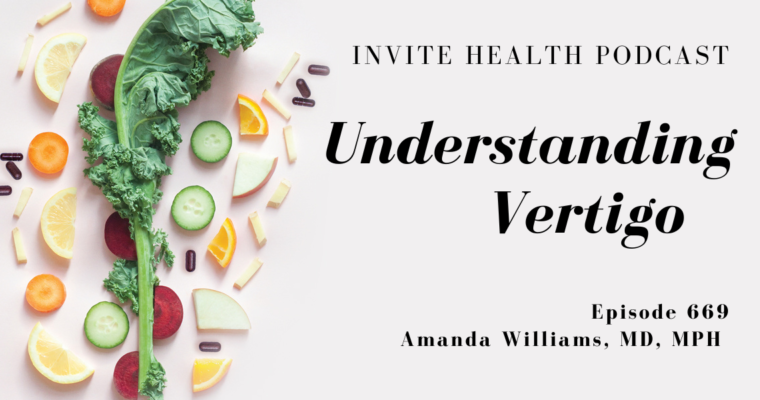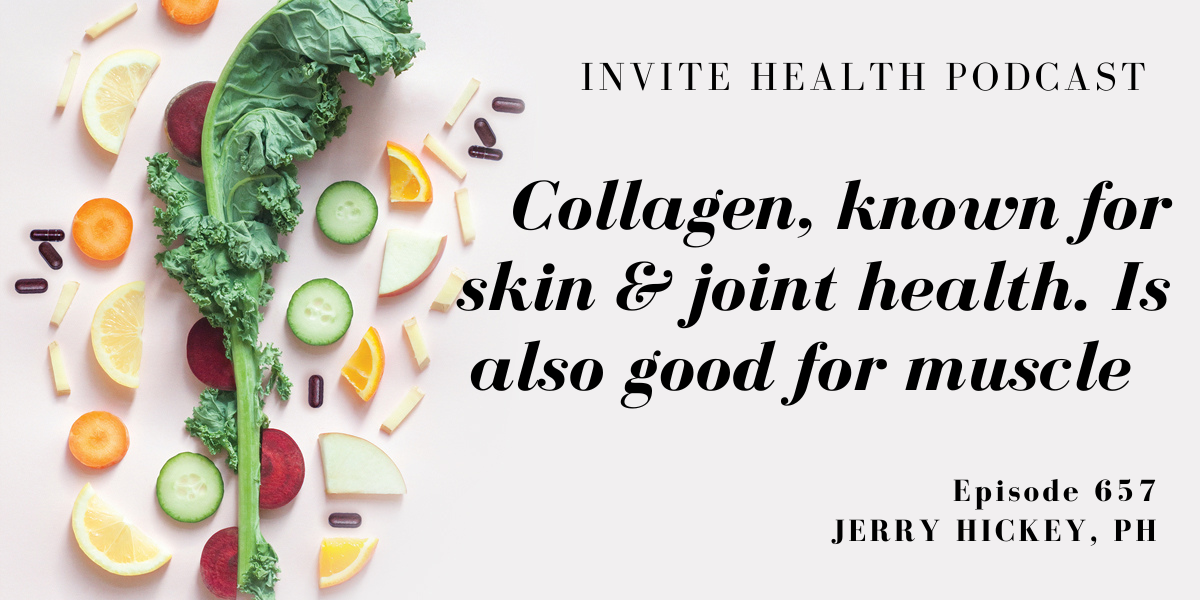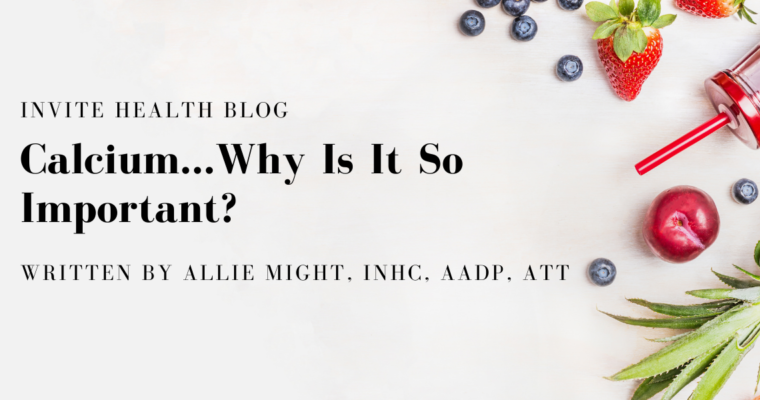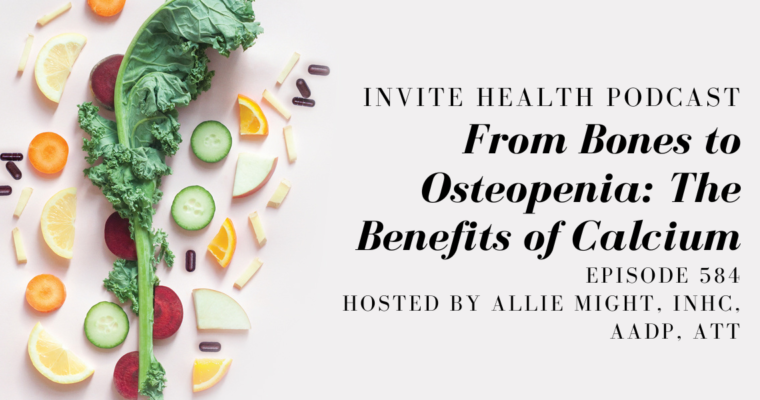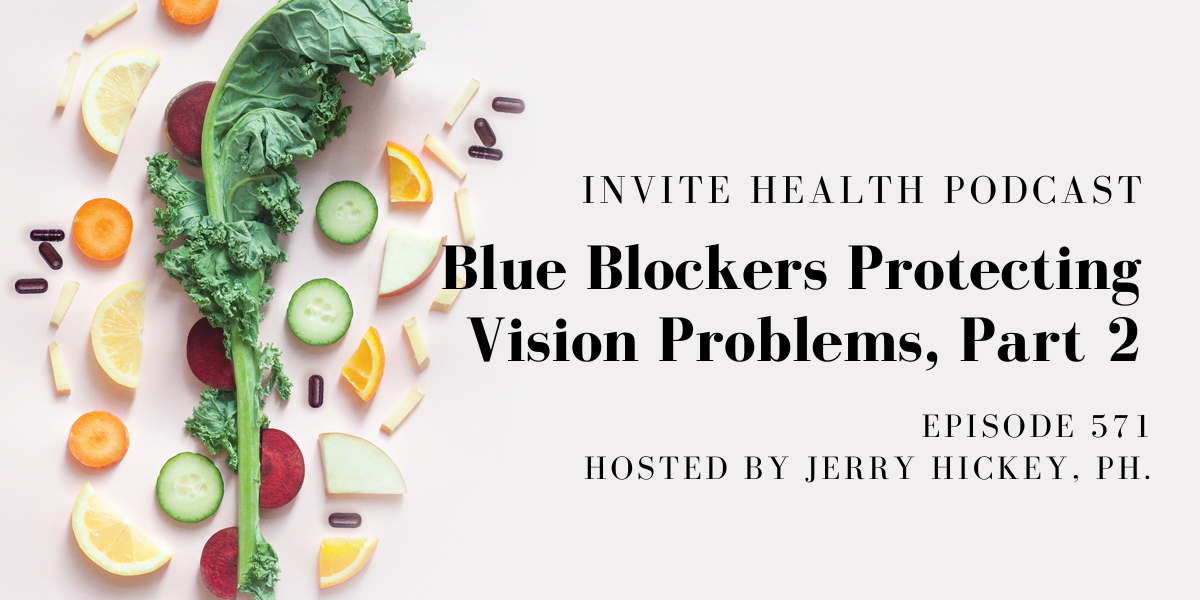Blue blockers
Subscribe Today!
Please see below for a complete transcript of this episode.
Blue Blockers Protecting Vision Problems, Part 2 – InViteⓇ Health Podcast, Episode 571
Hosted by Jerry Hickey, Ph.
*Intro music*
InViteⓇ Health Podcast Intro: Welcome to the InViteⓇ Health Podcast, where our degreed healthcare professionals are excited to offer you the most important health and wellness information you need to make informed choices about your health. You can learn more about the products discussed in each of these episodes and all that InViteⓇ Health has to offer at www.invitehealth.com/podcast. First time customers can use promo code PODCAST at checkout for an additional 15% off your first purchase. Let’s get started!†
*Intro music*
Jerry Hickey, Ph.: [00:00:40] Okay, welcome back to my podcast episode. Blue Blockers Protect You From Vision Problems and Alzheimer’s Disease. The blue blockers are found in green leafy vegetables. They’re called lutein and zeaxanthin. They help protect you from blue light and we’ll get into that over this episode. They’re very important. In fact, they’re so important that I generally recommend that people take additional as a supplement. So they found out researchers like at Harvard and Johns Hopkins, etc., Tufts, that green leafy vegetables are great for the brain and the eyes and they slow down the aging process and make aging a much better experience. And then they took the ingredients separately in studies and they found that, hey, these things are remarkably important and these are key nutrients in these foods that help block the aging process of the eyes and the brain and help reduce the risk of brain diseases such as Alzheimer’s and help reduce the risk of eye diseases such as age related macular degeneration and even cataracts and glaucoma, all these things that can rob you of vision and even cause blindness. So now we’re going to go into this a little bit deeper.†[00:01:55]
[00:01:57] So welcome back to the podcast. My name is Jerry Hickey. I’m a nutritional pharmacist. I’m also I am pretty good with this nutrition stuff. I have to say, you can find all of our episode for free wherever you listen to podcasts or go to invitehealth.com/podcast and please subscribe and leave a review. You can also find us on Facebook, Twitter and Instagram at InViteⓇ Health.† [00:02:21]
[00:02:24] So a quick review. Women tend to have more body fat than men, about 20%. There’s a much higher incidence of Alzheimer’s and other brain diseases in women that can occur at a younger age than men. And also eye diseases such as age related macular degeneration are much more common in women. Many of the pigments found in green leafy vegetables like arugula and broccoli and Brussel sprouts and lettuce and kale and spinach can get trapped in fat. And women tend to have 20% more body fat than men, like I just said. One of the things to protect you from it’s not just blue light, but it’s also oxygen. So I said that 60% of the oxygen with every inhalation goes to your brain. And if you don’t have enough of these antioxidants, molecules can be created that damaged brain cells, we said that part one of the of this podcast. So lutein and zeaxanthin are the primary carotenoids in our brain. You can get a little bit in pistachio nuts, you get it in egg yolks, you can get the zeaxanthin in corn, zea maize it’s named after corn zea maize, zeaxanthin. But you generally find them in green, leafy vegetables. I’ll go into a selection of green leafy vegetables at the end of this podcast episode.† [00:03:51]
[00:03:52] Now they are super concentrated in parts of our brain where we process information like where we know where we are and if we’re standing or sitting or what day it is, or what’s that person’s name or, you know, things like that and memory and learning. So they’re super concentrated in our hippocampus, which is core to learning and memory in our occipital and frontal lobes of our brain, where all of these things take place, all of these executive functions and cognitive skills take place. So evidence is rapidly building that the lutein and zeaxanthin found in these green leafy vegetables help prevent Alzheimer’s disease and a low level of lutein and zeaxanthin in your blood serum is tied into an increased risk of developing Alzheimer’s disease. This is in the Journal of Alzheimer’s Disease. And this is information from the rush memory and aging process. And also Inserm in France, a major research hub, and Oregon Health and Science University. † [00:04:57]
[00:04:59] Now additionally, lutein and zeaxanthin help stop the buildup of beta amyloid plaques in our brain, preventing them from gunking together and becoming toxic. This is according to Harvard researchers with a bunch of researchers from China who published their findings in the American Journal of Clinical Nutrition. But it gets bad in that. So lutein and zeaxanthin help prevent aging related diseases of the brain. But it gets better. Because lutein and zeaxanthin make the brain work better. They make the cells in your brain like the learning cells, the memory cells more efficient. They actually improve cognitive function, showing you how key they are. So it’s not just protecting the brain with lutein and zeaxanthin, you’re actually involved with making the brain function better. † [00:05:48]
LUTEIN AND ZEAXANTHIN: YOU NEED THESE FOR YOUR MEMORY – INVITE HEALTH PODCAST, EPISODE 537 >> Listen Now!
[00:05:51] So several studies led me up to doing this episode, this podcast episode in the first place. Several years ago, there was a super important study that was kind of like glossed over because everybody was focused on COVID 19. It was overlooked because of the pandemic, and it was a meta analysis. Now, this is important. A meta analysis, if done properly, tells you if something works or it doesn’t work. It could be a food, it could be a vitamin, it could be a surgical procedure or anything. A diet, that’s a meta analysis. † [00:06:29]
[00:06:30] So they scan, they do a systematic review of the information on a website such as Ovid and Web of Science and PubMed. And they look for key terms like in this case it would be lutein and zeaxanthin or green leafy vegetables, brain, neurological, Alzheimer’s, Parkinson’s, things like that. And then they gather all the evidence and they get rid of the studies that do not look right, that there’s something wrong. Like maybe there’s a bias, there’s a big risk of bias, or maybe the the results are just too good. There’s something wrong here. Or, you know, they’re not reported well, they’re not designed well. So they throw those out and they keep what’s left, which could be five studies, could be 100 studies. So then they analyze it. So all of a sudden they have this data from all these different research institutions, all these different clinics and hospitals and universities, etc., and medical schools. So all these different researchers, that takes out a further risk of bias and it gives you a lot more data and makes it very powerful because all of a sudden you’ve got a study of 100 people, you’ve got thousands and thousands and thousands, maybe even millions of people. So if you do it right, it tells you to something work or doesn’t work. So during the pandemic, they did this meta analysis which reviewed 24 different meta analysis, 24 different previous systematic reviews. † [00:08:03]
[00:08:05] So this means something. I mean, this this is very powerful. This is well powered. Many, many people, many, many years high intake of green leafy vegetables strongly led to a lower all cause mortality. Now, that’s profound. Researchers don’t commonly use words like strongly, so when they say a word like strongly, that really means something. They strongly lower, they strongly lead to a lower all cause mortality. So what’s all cause mortality, it’s the journal food chemistry. All cause mortality could be dying from anything, getting run over but that can happen because your brain’s foggy, you’re not paying attention, you get depressed, suicide. But usually it could be infections, Alzheimer’s disease, diabetes, a heart attack, a stroke, cancer. You know, the common causes of mortality, a broken hip, you know, broken hips lead to blood clots and infections. It could it could be really dangerous.† [00:09:04]
[00:09:05] So this big analysis shows a precise amount that you would need to consume daily to lower your risk of dying from all these different causes, including cancer. 100 grams of green, leafy vegetables a day. Now, if you have a salad with a arugula and different kinds of lettuce and you have a serving of spinach or broccoli, you can easily get to 100 grams. 100 grams is about three and a third ounces, three and a third ounces. Reduce the risk of all cause mortality by 25%, including cancer. I mean, that’s big. And Lutein and zeaxanthin are major players in green leafy vegetables. They help prevent memory loss because they’ve been studied separately. They’ve been taken as supplements and studied separately in many, many studies. And there’s a very large volume of research, huge amounts of green leafy vegetables and a very large volume of research now on lutein and zeaxanthin supplements. So the effect is real. The government needs to do the right thing and allow companies to put really strong claims on the labels for well-made lutein and zeaxanthin supplements about protecting the eyes and protecting the brain. It’s really time. They help prevent memory loss, they help prevent neurodegenerative diseases, including Alzheimer’s disease.† [00:10:37]
[00:10:39] But lutein and zeaxanthin protect your eyes also. And the eyes are connected to the brain. About 90% of the information your brain gets is from your vision. And if you look at, you know, when the eye doctor looks at the back of the eyes with that little sculptor actually looking at an extension of the brain, the optic nerve is the only part of the brain you can look at without doing surgery; they look in the eye with that little sculptor looking at the optic nerve, it’s a direct extension outside the brain. So and the eyes are connected to the brain, eye health is connected to brain health, so lutein and zeaxanthin protect the eyes also, especially all of those little sensitive, vulnerable little organelles and organs in the retina needed for fine vision, and they protect them from blue light. † [00:11:24]
[00:11:24] So let’s talk about blue light. The blue light spectrum is super high energy. It’s more energetic than red and orange and yellow and green and purple because it’s a very short wave. So when you’re looking at blue light, millions of these waves are hitting your eyes much more than other light waves. And this causes a glare and the glare, uses up your lutein and zeaxanthin. And what happens if too much lutein and zeaxanthin is used up? The macular tissue that’s a shield for the inside of your eyes starts to thin because it’s mostly made out of lutein and zeaxanthin. And this allows the blue light to penetrate and it can damage the retina. † [00:12:07]
[00:12:08] Now in young children and I’ve done podcast episodes on this in young children on screens all day, you’re getting a lot of blue light. You get blue light outside, of course, you’re in the daylight, blue sky. But on your computer screen, there’s a lot of blue light on a high definition television, on video games like X-Box and even on your cell phone, you’re getting blue light, you’re getting a lot more blue light than our ancestors, you’re getting a lot more exposure. This uses up the lutein and zeaxanthin in your macula. In young people, it leads to eye fatigue and brain fatigue, which there’s a clue there for your kid in college. Give them a lutein and zeaxanthin supplement, and they’ll probably do better academically, because their brain and their eyes won’t get as tired. Because I could tell you this, when I go on a computer screen, if I do lutein and zeaxanthin, I could go for hours without my eyes getting tired. If my eyes did get tired, if I didn’t take the lutein and zeaxanthin then my eyes got tired like after an hour or an hour and a half, if I take the lutein and zeaxanthin within about 10 minutes, my eyes aren’t tired anymore, it’s pretty amazing. And here’s something else that’s interesting, the lutein and Zeaxanthin have to negotiate their way, inside your brain to get to your eyes. † [00:13:21]
[00:13:22] So because they’re so important for the brain, the brain grabs a lot of lutein and zeaxanthin and holds onto it. Maybe not enough is getting to your eyeballs. I think it’s really important, especially as we get older, to take a lutein and zeaxanthin supplement because it does protect your eyes, it does protect your brain and does a lot more than that and even helps your brain work better and it and improves your day to day vision and your visual acuity, how sharply you see and contrast sensitivity like picking things out from a background, like you’re driving at night and it’s raining and it’s gloomy and everything. And you know, there’s a tree branch across the road. You’ll see it quicker if you have enough lutein and zeaxanthin in your eyeballs and help you recover from glare quicker. They did a study at the Moran, eye center. That’s the University of Utah, and when they gave elderly, it was something like 100 very elderly people. When they gave them lutein and zeaxanthin or placebo, over the course of a year, the people on lutein and zeaxanthin their vision actually improved a little bit, which is just the opposite of what normally occurs with aging. They did an interesting study in China on people who dried professionally hours and hours and hours of driving every day. These people do an amazing amount of driving like truck drivers, etc., that driving across China and the Gobi Desert, etc. And when they gave them lutein, it really helped their vision. It really helped her eye fatigue and their brain fatigue and their ability to pay attention while they were driving, etc. † [00:14:39]
[00:14:39] So these are incredibly important for our eyes and the optic nerve that goes into your eyes as a direct extension out of our brain. So on a protective side, once again, they reduce glare, uh, the glare from the blue light. Oh, and let me just say something else. Let me backtrack a little bit. In young people, use up the lutein and zeaxanthin by going on a computer screen all day, their eyes and their brain get tired. But in older people, it’s worse than that. You can actually get some eye damage and brain damage. So you always want enough lutein and zeaxanthin. And unfortunately, with age, this happens with a number of nutrients like zinc, you absorb less zinc with age, you absorb less fish oils for your meals with age, you absorb less lutein and zeaxanthin from your food with age. So it really becomes important to take a good supplement. So on the protective side with lutein and zeaxanthin they reduce glare in the eyes and this affects your visual processing speed and it can improve their contrast sensitivity, their visual stamina, the visual acuity. This affects our ability to solve problems. This affects our memory. This affects our executive functions and also protects our hippocampal region, which is so important for our memory. I’ve done some podcast episodes on the hippocampus, our frontal cortex of our brain and regions of our eyes. I mean, so key. The lutein and zeaxanthin help prevent age related vision loss and age related blindness, I’m going to go into some studies now. † [00:16:19]
[00:16:22] They help prevent the development of the diseases, including brain diseases like memory loss well, I mean, that’s not a disease, anybody can have memory loss, subjective memory loss. But they help prevent memory loss and they help prevent the development and disease of diseases like Alzheimer’s disease. And their progression, which means worsening progress is not always a good thing, progress of the disease means it’s worsening. So there was a very recent study in nutritional neuroscience, and this was the direct trigger for me to do this podcast episode. It was published on June 11th of this year. Consuming lutein and zeaxanthin rich foods reduced the risk of dementia and reduced the risk of eye diseases. † [00:17:10]
[00:17:14] Now, this is a benign approach to getting antioxidant defenses to help prevent inflamaging, to help prevent memory loss, to help prevent brain diseases, to help prevent eye disease. A lot of green leafy vegetables. So let’s get back to women. You have to take into account women’s immune systems. There’s this really brilliant researcher, Dr. Billy Hammond, he’s the kind of person I follow when it comes to the science of nutrition. He’s the principal scientist in Division Sciences Laboratory at the University of Georgia, that’s in Athens, Georgia. They do a lot of brain research and fusion research at the University of Georgia in Athens. He’s also a professor of the Brain and Behavioral Sciences Program at the University of Georgia. And he’s done a great deal of research on diseases of aging in women that affect both vision and memory. And he’s also done a great deal of research on lutein and zeaxanthin because they’re so key.† [00:18:16]

[00:18:19] So I’m going to quote Dr. Hammond now. “Females have a much more robust immune response, but then suffer from the long term consequences such as enhanced responses, injury” end of quote. So women’s immune systems, because they have to go through pregnancy, etc. are very powerful, they’re more powerful than men. Now, when the immune system is really functioning well, you’re releasing chemical messengers like chemokines and cytokines, like interleukin six. These are the things that have damaged the lungs of people with COVID 19 that led to so many deaths. Antioxidants are some of the things that quench those things and protect regions of the brain in the eyes and the lungs and every other part of body. So it’s very key for women to have enough of these nutrients, especially since some of these nutrients get trapped in the fat in your body, have a higher fat content in general than men. So they actually need more of these nutrients. That’s really key to a long, healthy life for women. So let’s look at the nurses health study. It’s almost 50,000 nurses that were followed for a 22 year period, that’s amazing. Women in the highest quintile of intake of lutein and zeaxanthin quintile would be the top 20%. Women in the top 20% of intake of lutein and zeaxanthin had a 24% lowered likelihood of reporting reduced cognitive function over the 22 year period. But don’t forget, these women were getting questioned by the researchers all the time. There was always follow up questioning. So when they would ask these women, you know, how’s your memory? How’s your brain? They’d say, Well, my, my brain is fine. I’m not I’m not forgetting words and I’m not forgetting that I’ve been somewhere or read a book, etc., and I can remember things and I can learn. They had a lot of these green leafy vegetables, they were getting in a lot of lutein and zeaxanthin. † [00:20:14]
[00:20:17] So here’s the problem in a nutshell, women just need more lutein and zeaxanthin and carotenoid pigments in general like lycopene. So here’s the Journal of Vision Research. That’s the Shepherd’s Eye Research Institute in Boston. Although women tend to consume more lutein and zeaxanthin than men, women average 38% less lutein and zeaxanthin in their retinas. So potentially this is going to affect their eye health and their brain. It’s all connected. So even though women tend to eat more green, leafy vegetables and high quality foods, etc., than men, they tend to have 38% lutein and zeaxanthin in their eyeball and their retina where it counts. And lutein and zeaxanthin are the only carotenoids, and you’re right, they’re the only ones. They’re the most important carotenoids in your brain also. So they protect the retina from the blue light and other insults. And if you don’t have enough whatever there is depleted quickly, it’s used up very quickly and then you’re really in trouble. † [00:21:24]
[00:21:26] So using a pollutant and zeaxanthin in your eyeballs will then quickly use up the remaining lutein and zeaxanthin in your brain, and your brain won’t work as efficiently, but it’s more likely to get damaged by the free radicals are always occurring in your brain at high levels. So it’s a problem. Potentially, this also leads to cataracts. There’s studies showing that when you have enough lutein and zeaxanthin, but also zinc and other nutrients, it lowers the risk of having cataracts. There’s a big study from Finland showing that. † [00:22:02]
[00:22:04] And you know what? There’s also a recent study using data from Rush Russia’s Memory Project. The Rush Institute is over in Chicago, and they study aging. And they’re the people that came up with the MIND diet. They took the the best of the Mediterranean diet and combined it with what they considered the best of the dash diet. The Dash diet is a diet developed to help prevent heart disease and high blood pressure, etc. Help prevent strokes and heart attacks. So they mixed the Mediterranean diet with the dash diet. Now these are patterns of eating. They’re not like calorie restricted, restricting diets aimed at dieting and losing weight. However, when you eat properly like these kind of foods, you lose weight anyway. They’re not fattening foods and they’re super healthy foods. So they use- and they’ve proven with this MIND diet that it cuts to risk of Alzheimer’s so they were using so I’m doing one more brain study because I kind of left it out before using a Rush memory project data higher in take of total carotenoids substantially. And once again, that’s a huge word for researchers, lowers the hazard of developing Alzheimer’s disease by an incredibly powerful 48%. So a good diet, there’s other things that lower the risk of Alzheimer’s reading, studying, learning, talking to people, being social, getting enough sleep, getting exercise. All these things help lower the risk of Alzheimer’s disease. But they found that intake of total carotenoids and there’s a lot of data on this this is just one thing I’m quoting especially lutein and zeaxanthin lower the risk of developing Alzheimer’s disease by an incredibly substantial and incredibly powerful 48%. These are Harvard researchers. And they found that this help prevent a buildup of beta amyloid plaques in the brain and also lowered fibril formation. That’s the sticky plaques that become so damaging and toxic in your brain. † [00:24:06]
KNOWLEDGE IS POWER: LEARN MORE ABOUT THE BRAIN HEALTH PROGRAM >> Read Now!
[00:24:08] So age related macular degeneration is a major cause of vision loss and blindness in people over the age of 55. And it’s more common in women by far. So these are Harvard researchers, people who consume the most lutein and zeaxanthin have a 40% lowered risk of advanced age related macular degeneration, which leads to blindness. This was approximately 100,000 men and women. It was published in JAMA Ophthalmology. So the data is real, the data is real. Additionally, other carotenoids in the study, like beta carotene and alpha carotene especially reduce the risk of age related macular degeneration by 25 to 35%. But there’s more Harvard research looking at glaucoma. Glaucoma is very common. It’s usually from pressure in the eyeballs. The plumbing of the eyeball isn’t working properly, and you get a buildup of fluids and they’re crushing down on the retina and they cause damage to the retina and they can lead to vision loss and blindness. It’s a very common cause of vision loss and blindness, especially in older people. So this is more Harvard research. And once again, it’s it’s almost 100,000 men and women, it’s from two very long term studies mixed together. Both of them lasted longer than 25 years. So this is really good data consuming a lot of green leafy vegetables reduce the risk of developing glaucoma by 20 to 30%. † [00:25:33]
[00:25:35] So studies of lutein and zeaxanthin, they don’t just protect the eyeball, they actually improve your vision health. Like I mentioned at Marin Eye Health, that eye center study at the University of Utah. So not only do they make the brain work more efficiently, they make the eyes work more efficiently. I remember the study, I can’t find it now because I read it many years ago. All they did was give women DHEA and lutein, and their memory improved, their cognitive functions improved. That’s all they did was give them lutein and DHEA. DHEA is one of the two most important oils in fish oil capsules and eating fish. It’s very important for the brain and memory. Studies show that if you get 100, 200 milligrams of DHA every day, you cut your risk of Alzheimer’s disease by about 36%. So it’s really, but they also are really super important for your memory. † [00:26:22]
[00:26:25] Now, just a couple of other things. High blood levels of lycopene and lutein and zeaxanthin in research reduced the risk of breast cancer and ovarian cancers. They lead to stronger bones because they reduce inflammation in the bones. And this improves osteoblast activity, which builds bone and reduces osteoblast activity that breaks down bones. So when you reduce the inflammation in the bones, you’re actually building bone. So they’re important for that, too. And they help prevent sarcopenia, which is that age associated loss of muscle and strength, which is a hazard, because then that affects your balance and your mobility and your independence. They lead to a healthier heart, better circulation, healthier skin, they even reduce wrinkling and help protect your skin from the sun and a reduced risk of autoimmune diseases so these are really important foods. † [00:27:14]
[00:27:14] So the take away, have a lot of green leafy vegetables every day. Now, a couple of caveats there, don’t have raw cabbage, vegetables cause there’s goitrogens in there. Things that slow down your thyroid gland, your thyroid gland you need it for your memory and heart health and reducing inflammation for energy and strength, etc. So you don’t want to slow down your thyroid, so cook your cabbage vegetables and there’s a lot of cabbage vegetables. I mean, there’s broccoli rabe, there’s bok choy, there’s collard greens, there’s kale. I grew up on kale when I was a little kid in Ireland, we grew up on kale, we ate so much kale, we never ate cabbage, we ate kale. Cabbage, brussels sprouts, all these things are in the cabbage family. I wouldn’t have them more than four times a week and I would cook them, four times a week is fine. So on the other days you’ll look at other greens like lettuce, dandelion greens. I was very good friends with a family from Barry, Italy and they would make salads on Sunday afternoon with dandelion greens, and I got to tell you, it was so bitter, but they’re super healthy. Lettuce, arugula, all those are greens. But don’t risk it, take a well-made, natural source of lutein and zeaxanthin. The synthetic doesn’t work well, it’s sort of a different chemical structure. They don’t have that nailed properly.† [00:28:38]
[00:28:38] So you want a natural lutein and zeaxanthin. Generally, they get these from flowers. They reduce your risk of depression, they reduce your risk of eye inflammation, they reduce your risk of Alzheimer’s disease. You’ll want to add to that some fish oils, you want your B vitamins, you want your minerals, especially your zinc and your magnesium and adequate calcium, you want your vitamin C. If you want a couple of other things that are great for the brain, well absorbed turmeric. Turmeric is very poorly absorbed, it’s that pigment and curry that gives it that smell and taste and color. Well absorbed turmeric is great for the brain, resveratrol is good for the brain, acetyl-l-carnitine is good for the brain. Alpha lipoic acid is good for the brain. These are all things we’ve done podcasts on.† [00:29:20]
[00:29:20] So I want to thank you for listening to today’s episode. You can listen to all of our episodes wherever you listen to the podcast for free or go to invitehealth.com/podcast. And if you could subscribe and leave a review, it would be very helpful. You can also find us on Twitter, Instagram and Facebook at InViteⓇ Health. I want to thank you for listening today and please join me again in future podcast episodes. Jerry Hickey, signing off, have a great day. † [00:29:20]
*Exit Music*



